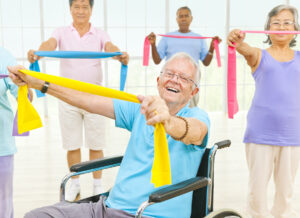Home Care Assistance Tips For Exercise After 65

Senior Home Care Woodbridge VA
Exercise is one of the most important things that seniors can do to stay healthy as they get older. But, seniors over the age of 65 who want to increase the amount of exercise that they’re doing often overdo it and cause themselves injuries. Seniors who are trying to exercise more should rely on senior home care to help them get ready to exercise.
Senior home care providers can also be great workout pals to help motivate seniors to exercise daily. Before they start working out everyday, they should take note of these tips.
Talk To Your Doctor First
Before starting a new exercise regimen, seniors should consult their healthcare provider, especially if they have pre-existing medical conditions or are taking medications. A medical professional can provide personalized recommendations and help tailor an exercise plan that aligns with their health status.
Low-Impact Exercise Is Best For Seniors
Seniors should focus on low-impact exercises that align with their abilities and preferences. Low-impact activities like walking, swimming, cycling, tai chi, and yoga are excellent choices that promote cardiovascular fitness, flexibility, and balance without putting excessive strain on joints.
Don’t Skip The Warm-Up Or Cool-Down
Proper warm-up and cool-down routines are essential to prevent injuries. Gentle stretches and light cardio activities can help prepare the body for exercise and promote recovery afterward. Lots of seniors skip these steps and end up with muscle pulls, strains, or other injuries. Take the time to warm-up and cool-down, especially when the weather is cold.
Don’t Skip The Weights
Incorporating strength training exercises is crucial for preserving muscle mass and bone density. Seniors can use resistance bands, bodyweight exercises, or light weights to maintain strength and functional independence.
Focus On Balance And Flexibility
As people age, maintaining balance and flexibility becomes increasingly important to prevent falls and injuries. Incorporating exercises like standing on one leg, heel-to-toe walking, and gentle stretches can help improve these aspects.
Start Slow And Steady
Seniors should avoid overexertion and focus on moderate exercise. Gradually increasing intensity and duration over time allows the body to adapt safely. Consistency is the most important part of developing a workout so even if you can only exercise for five or ten minutes at first do it daily and soon you will be able to do more.
Stay Hydrated
Dehydration can occur more easily as people age. Seniors should drink water before, during, and after exercise to maintain proper hydration levels.
Get The Right Footwear
Wearing appropriate footwear with proper arch support and cushioning is essential for preventing foot and joint pain during exercise.
Listen to Your Body
Seniors should pay attention to their bodies and stop exercising if they experience pain, dizziness, shortness of breath, or any other unusual symptoms.
Give Yourself Recovery Time
Giving the body sufficient time to rest and recover between exercise sessions is important, especially for seniors. Rest allows muscles and joints to repair and prevents overuse injuries.
Check In With Your Doctor
Seniors should schedule regular check-ups with their healthcare provider to monitor their overall health and discuss any changes in their exercise routine.
